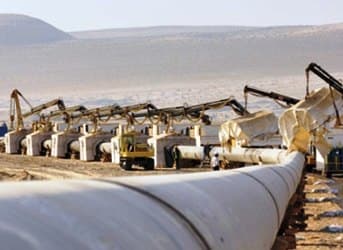A pipeline designed to carry up to 125,000 barrels of oil per day was attacked in Yemen, halting the flow of crude oil to Yemeni ports. Yemen relies on oil exports for more than half of its government spending and the country's president said last week his economy would grind to a halt if oil companies flee the national security situation there. The attack comes amid growing concerns about the possibility of al-Qaida plots in Yemen and elsewhere in the region. It also follows an emerging trend in the region's energy sector.
Yemen's official Saba News Agency blamed the attack on frustrated tribesmen, who've pressed the embattled government for more financial concessions. The attack came less than a week after a similar incident on a pipeline designed to carry 125,000 barrels of oil per day from the Safer oilfields to an export terminal in al-Hudaydah province, along the eastern coast.
Yemen produces nearly 300,000 bpd. Attacks on oil infrastructure cost the government more than $1 billion last year and oil exports dropped by 4.5 percent. Yemeni President Abd Rabbuh Mansur Hadi told U.S. President Barack Obama he was concerned about the economic situation given the heightened state of security in his country.
Related article: How Much is Oil Supporting U.S. Employment Gains?
"Yemen's development basically came to a halt whereby there is no tourism," he said. "And the oil companies had to leave the country as a result of the presence of al-Qaida."
A day after he made those comments, the U.S. State Department announced it was closing embassies in the region because of the threat from terrorism. On Sunday, the British government followed suit, saying it was closing its embassy in Yemen as a precautionary measure. A corresponding travel advisory from the British government called on any of its nationals still remaining in Yemen "to leave now."
Security officials said the Yemeni government is on high alert for a terrorist attack, possible coinciding with the end of Ramadan. Yemen's official news agency said the Interior Ministry called for tightened security measures near power grids, Western embassies and oil pipelines "during the holiday of Eid al-Fitr," an occasion that begins Wednesday evening to mark the end of the holy month.
Related article: Waiting on Egypt for Oil & Gas Investment
Details of the possible al-Qaida attacks made little, if any, reference to the energy sector. A series of high-profile attacks this year, however, have put the oil sector in the cross hairs of al-Qaida and its regional affiliates. In January, the International News Safety Institute, which looks into security issues for journalists traveling through hostile countries, was alerted by "credible sources" that terrorist groups may be planning attacks on oil fields in Libya. In mid-January, a faction of al-Qaeda in the Islamic Maghreb stormed the In Amenas natural gas facility in eastern Algeria. Among the dead in that attack were employees from British energy company BP and Norway's Statoil.
The 9/11 attacks on the United States struck the twin towers of the World Trade Center, a symbol of U.S. economic might. Osama bin Laden, in his 2002 "letter to America," expressed outrage at the United States because "you steal our wealth and oil." Al-Qaida's war may be against Western ideology and its influence on regional affairs. More than 10 years after the worst terrorist attack on American soil, and a global economic recession later, its war seems now to have put oil at the top of its target list.
ADVERTISEMENT
By. Daniel J. Graeber of Oilprice.com



















We find it very interesting that you offer this take..."Details of the possible al-Qaida attacks made little, if any, reference to the energy sector. A series of high-profile attacks this year, however, have put the oil sector in the cross hairs of al-Qaida and its regional affiliates...."
We wonder if your readers or anyone at the NSA cares to consider why no mention of these Oil infrastructure incidents are not tagged to the Drone strikes in Yemen today...?
It would be nice if you could offer GPS coordinates of the exact locations of the Yemen pipeline skirmishes for citizens to actually use on Google Earth so they could see for themselves..!!
Keep it up ..."Daniel"